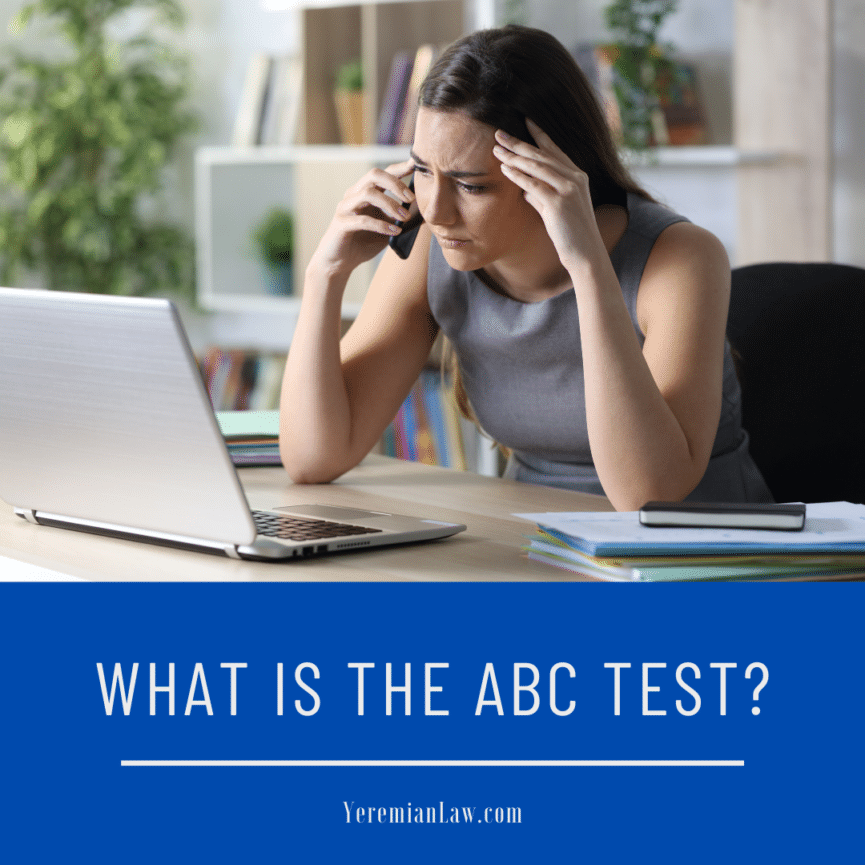If you’re a worker in California, you need to know the ABC test most likely applies to you. It’s a test that determines whether you’re an employee or an independent contractor – and that distinction plays a big role in the way your employer pays you and the benefits you’re entitled to receive.
What is the ABC Test for Employees and Independent Contractors?
The ABC test is a test that determines whether you’re an employee or an independent contractor under California Labor Code, the Unemployment Insurance Code, the Industrial Welfare Commission wage orders. It’s required under Assembly Bill 5, which Gov. Gavin Newsom signed into law in September 2019.
If your employer shows these three things, you’re considered an independent contractor:
- You work free from your employer’s control and direction in connection with the way you perform your work. That means you perform your work when and how you want to provide a finished product, though you can be subject to deadlines imposed by your employer.
- You perform work that’s outside the usual course of your employer’s business. For example, you work as an administrative assistant for a company that provides consumer products or as a blogger for a law firm.
- You are customarily engaged in an independently established trade, occupation or business of the same nature as the work you perform for your employer. For example, you may work as a freelance blogger or administrative assistant for other companies through your own established business (or intend to do so if you haven’t established yourself yet).
If your employer cannot show those three things, you’re an employee of the company and are entitled to the same benefits that employees receive.
Related: What happens if an employer intentionally misclassifies you as an employee?
Why Does it Matter Whether You’re an Independent Contractor or Employee?
Independent contractors and employees are entitled to different rights and benefits under California law. The following table outlines the differences between the two.
| Employee | Independent Contractor |
| Covered by federal and state employment and labor laws | Not covered by employment and labor laws |
| Employer withholds taxes from pay | Pays own taxes |
| Employer reports information for state and federal unemployment insurance; can draw unemployment in some cases | No reporting; ineligible for unemployment insurance payments in most cases |
| Earns an hourly rate or salary | May earn a set fee for a project, hourly or daily pay, weekly pay or monthly pay |
What About the Borello Test?
The Borello Test, established by the California Supreme Court in 1989, is sometimes used to determine whether an employer has control over the manner and means of an employee’s work. It considers:
- Whether the worker “holds themselves out” as being engaged in an occupation or business distinct from that of the worker’s employer. For example, a freelancer who has a website offering services such as accounting, copywriting or assisting is “holding themselves out” as being engaged in a particular occupation – and as long as that occupation is different from what the employer normally provides, this factor is satisfied.
- Whether the work the worker is performing is a regular or integral part of the employer’s business. For example, a web design company that hires a freelance web designer, which is absolutely necessary to the company’s bottom line, may actually be working with an employee rather than an independent contractor.
- Whether the employer or worker supplies the tools and place for the worker who’s performing the work. For example, if the employer provides an office space, computer and other tools that the worker needs to get the job done, the worker may be an employee; if the worker provides them, the worker may be an independent contractor (though this isn’t a sole determining factor).
- Whether the worker has invested in the business
- Whether the service the worker is providing requires a special skill
There are other factors, as well. However, the Borello Test may not ever be necessary if the ABC test can determine whether a worker is an employee or independent contractor.
Related: What can you do if you’re a misclassified employee?
Do You Need to Talk to a Lawyer About Your Employee or Independent Contractor Status?
If you suspect your employer has misclassified you as an employee or independent contractor, we may be able to help you. Call our office at 818-230-8380 or fill out the form below to schedule a free consultation with an experienced and knowledgeable attorney. You may be entitled to benefits or additional compensation.




